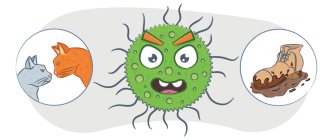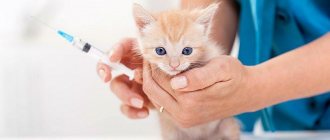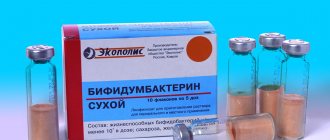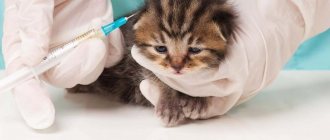Traditionally, before vaccination, a deworming procedure is carried out. Simply put, the cat needs to be dewormed and treated for other parasites. Many people believe that helminths weaken the animal’s body, making it difficult for it to fight off vaccinated pathogens.
Let's find out how many days before to vaccinate a cat with anthelmintic and whether it is necessary to do it.
How many days before vaccination is deworming carried out?
Veterinarians recommend deworming your cat before vaccination. It is best to do this 1-3 weeks before the procedure, depending on the antiparasitic drug and type of vaccine:
- If the kitten will receive the first vaccinations in its life, complete treatment against helminths should be completed no earlier than 7 days.
- If you plan to introduce a complex vaccine (against several infections simultaneously), then you need to drive away helminths at least 10 days before the procedure.
- If a complex vaccination is given a second time, at least 21 days must pass after deworming.
- Vaccination against rabies for a cat after deworming should be done strictly within a month.
Important! If the kitten's parents were not treated before mating or helminths were found in the feces, the tablets should be re-taken after 10 days.
Who must undergo the procedure?
Patients with symptoms of coronavirus and patients whose diagnosis has already been confirmed.
The list of people suspected of having coronavirus includes the following categories:
- Citizens interacting with COVID-19 patients;
- Patients with lung damage;
- Citizens over 65 years of age with ARVI symptoms;
- Healthcare workers at increased risk of contracting COVID-19 while performing their duties. The test must be taken on a regular basis - once every 7 days;
- All medical personnel with ARVI symptoms;
- Citizens with ARVI symptoms who are permanently staying in closed institutions. The test requirement also applies to employees of these institutions.
The test is recommended for those who have symptoms of ARVI. If you have a cold, you need to go to the clinic at your place of residence and call a specialist to your home to take a smear.
PCR at home (Rostov) can be done at our Heratsi clinic. Our specialist will arrive at the specified address and collect a smear in accordance with the established procedure. Results can be received as quickly as possible by email.
Employers undertake to test employees via PCR on a regular basis to form an idea of the presence or absence of COVID-19 among staff.
Preparatory stage
- A few hours before taking a smear, a ban on eating and brushing teeth is imposed;
- A few hours before the analysis, it is not recommended to use rinsing medications, the same applies to tablets;
- Before taking biological material, you should not chew chewing gum:
- If you have nasal congestion, you need to clear your nose.
How does the analysis take place?
The specialist uses a special sterile stick, which is used to take a smear from the palate and the inner surface of the mouth or nasal cavity. Next, the material is sealed in a container and sent to the laboratory.
If necessary, a specialist can come to your home to perform the procedure. Residents of megacities can apply for a test at the CT center. PCR in Rostov can be taken free of charge if you have symptoms in government institutions, or for a fee in our clinic.
The test can show the presence or absence of infection in the patient's body. If the result is positive, then another control test is carried out, based on which it is confirmed that the patient is sick with coronavirus.
A negative result cannot guarantee the exact absence of infection in the human body. It's all about the sensitivity of the test; if there is a low concentration of viral cells in the body, then the analysis may not detect it. The doctor decides what to do next. If symptoms are present, treatment is continued and a repeat test is ordered. You can get an accurate PCR result in Rostov by contacting our clinic for testing; we use modern technologies and perform the procedure in accordance with the requirements.
To ensure that the patient has recovered, two tests must be carried out, and in both cases the results must be negative. After this, the patient can leave self-isolation and return to his normal life. This requirement is mandatory; without its fulfillment, a person will not be able to be discharged from the medical institution where he was treated.
Where can I get PCR tests for a fee?
You can undergo the testing procedure at a private medical institution. The service is paid and is available to those people who have not come into contact with sick people and do not have symptoms. The price for PCR analysis is presented on our website in the “Price” section.
Those who have symptoms of ARVI are advised to call a specialist to their home, who will perform all the necessary actions and deliver the collected biological material to the laboratory.
This method is the safest for the patient and others, it eliminates the possibility of spreading infection and quickly obtains results, usually 2 days after taking the test, urgently after 24 hours, ultra-urgently after 12 hours.
How to properly treat parasites
Before giving your pet deworming medications, you need to treat it for fleas and ticks to completely get rid of these parasites.
The dosage of anthelmintic tablets and suspensions is calculated by the veterinarian, taking into account the weight of the pet. It is important that the cat receives a sufficient amount of the drug, which will help completely remove the helminths.
Review of effective drugs
It is best to consult a veterinarian before purchasing the drug.
Popular deworming remedies for cats:
- Drontal. Used for treatment and prevention. Available in tablet form.
- Cestal. The animal eats the tablet with pleasure because the drug smells like liver.
- Pirantel. Effectively removes both adult helminths and their larvae. Not suitable for kittens. There are two forms of release - tablets and suspension.
- Dirofen. Can be given to adult cats and kittens. Available in the form of suspension, paste and tablets.
- Prazitel. An effective suspension for animals of any age.
- Fenbendazole. It can be used not only as an anthelmintic, but also for intestinal infections.
Before giving the drug to your pet, you should consult a doctor about the quality of the chosen anthelmintic for cats.
Important! There is no need to grind the tablet into powder and give it to your pet with food - this way the cat will not eat the required dose.
If a cat doesn’t go outside, is it possible not to “worm” it?
All animals must be routinely dewormed before vaccination. If a cat does not leave the apartment, this does not guarantee its protection from contracting dangerous infections.
The causative agent of a fatal disease can enter a home on the owner’s street clothes and shoes; a pet can get it through contact with other animals during a routine visit to the veterinary clinic. Cats taking part in exhibitions and various competitions must be vaccinated, even if they do not go outside for walks.
Contraindications and side effects
Anthelmintic drugs for cats have a number of contraindications and side effects:
- the kitten is less than 2 months old;
- a nursing or pregnant cat (at least 3 weeks must pass after the birth of kittens);
- the pet is underweight;
- problems with the digestive system;
- presence of infectious diseases;
- allergy to the drug.
If you follow the conditions for taking anthelmintic drugs for cats, there will most likely be no side effects. But in some cases, diarrhea, vomiting, loss of appetite and lethargy may occur.
When is deworming contraindicated?
Veterinarians prohibit giving anthelmintic treatment under the following circumstances:
If there are signs of exhaustion, both procedures are not performed.
- Acute allergic reaction to the components of the composition. Before you chase your cat away, you need to make sure that all components are safe.
- The period of gestation. The consequence may be miscarriage or death of babies in the womb.
- Presence of kidney stones.
- Lack of body weight. If your pet is exhausted, it is better to postpone the procedure.
- Diseases of viral and infectious nature. If your immune defense is weakened, you should not put additional stress on the body. The likelihood of rashes, scabies and hair loss increases.
- Little age. Until the babies are 2 months old. It is better not to give medications for parasites.
The myth about the need to take anthelmintic drugs
Deworming is extremely important for keeping pets healthy, but is it necessary to do the procedure before vaccination? There is no scientific evidence that the presence of parasites reduces post-vaccination immunity and prevents a pet from fighting infections against which it will be vaccinated. As for allergies when the vaccine reacts with parasites, it can occur in rare cases.
Another misconception is that after a vaccine, “weakened immunity” is susceptible to a rapid increase in the number of helminths in the pet’s body. In fact, parasites do not reproduce so quickly, so it is not necessary to worm the cat before vaccination.
Important! There is no urgent need to treat the pet for helminths before vaccination, however, if the owner carries out prophylaxis against parasites, the cat will not get any worse.
If the animal undergoes scheduled treatment throughout the year, then it is not necessary to give the cat anthelmintic 10 days before vaccination. Veterinarians recommend anthelmintic treatment for cats before vaccination if the owner does not worm the pet regularly.
Common parasites in cats
Why is it important
When vaccinated, weakened pathogens of various infections are introduced into the cat’s body. They cannot cause disease, but contain antigens. In response, the immune system produces antibodies - special active substances that help destroy “uninvited guests”.
Helminths take away some of the nutrients, causing the cat to experience a deficiency of vitamins and minerals. In the process of parasitism, the functioning of internal organs is also disrupted, the immune system is weakened, and its protective functions are reduced, which facilitates the penetration of pathogenic microorganisms into the animal’s body. As a result, the immune system cannot provide a full response to vaccine antigens. In addition, if there are two enemies in the body - worms and viruses - the immune system has to fight on 2 fronts, which turns out to be quite difficult for it. As a result, vaccination may be useless: immunity to the vaccine will not develop, and the cat will get sick the first time it encounters the virus. This situation is called “breakthrough of post-vaccination immunity.”
It is especially important to eliminate parasites before rabies vaccination. This vaccination requires an adequate immune response to provide full protection. If the immune system is not strong enough, the cat may become infected with a fatal infection.











